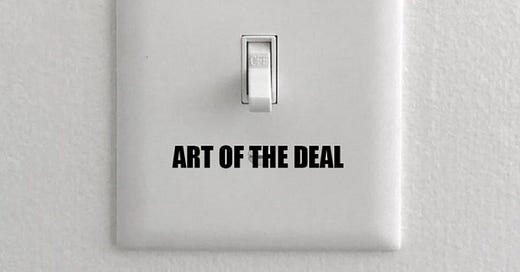In 2016 I wrote that Donald Trump was not a politician because he literally does not understand mutual benefit:
Being a politician requires some conception of bargaining and mutual benefit, which Trump lacks utterly. For Trump, the only acceptable outcome of any transaction is the one where he wins and you get screwed.
Harvard negotiation expert Sheila Heen has reached the same conclusion in advising law firms not to negotiate with Trump:
I’m now offering advice that I almost never give.
Do not negotiate.
President Trump is a caricature of a unidimensional negotiator, operating exclusively from the domain of power. He rarely appears to care about the issues at hand or the people directly or indirectly affected by his actions. He tramples on rights – human rights, due process rights, constitutional rights – willy-nilly. Oft described as a schoolyard bully, Trump’s attacks on law firms are not about DEI and pro bono hours any more than the playground shakedown is about the lunch money.
Trump’s “investigations” are vindictive accusations, offering no evidence or due process while threatening immediate and sweeping sanctions. Trump’s message is clear “do what I say, or I will destroy you.”
Sheila Heen, Don’t Negotiate
This all fits. It explains the administration’s inability to set any actual policy (which would involve confronting trade-offs), as well as why Trump defenders sound like Lost fans desperately trying to figure out the ending. There’s no larger logic to be had.
Heen’s right to say that negotiating is pointless because the goal isn’t agreement, it’s capitulation. Without a conception of mutual benefit, negotiation lacks meaning. Trump and his cronies are simply demanding defeat. And no one should be under any illusion that actual negotiation is taking place.
But what do you do when the bully is one of the most powerful people in the world? Collective action is difficult at the best of times, and this is not the best of times. Heen’s specific recommendation is for firms to sign the amicus brief on behalf of Perkins Coie, who are pushing back against Trump.
This moment is your lowest-cost, highest-impact opportunity to signal early that you are not open to intimidation. It tells the President not to waste time on you, and to move on. And the more firms stand together, the less likely Trump will be to stick with this strategy. He tends to back down when he encounters enough resistance, and his attention turns elsewhere.
True—to a point. Trump will likely turn elsewhere, but before doing so he will make an example out of one or more firms before doing so. One difficulty in collective resistance is that no individual actor wants to risk taking a hit for collective benefit. Real collective action only emerges when the when for a significant majority of the actors, the status quo is manifestly as bad as taking the hit. Corporate law firms are not likely to reach that point any time soon.
Realizing this, Heen offers a number of arguments to argue against capitulation, none of them especially convincing. Heen tries enlightened self-interest (resisting firms will attract more clients and better hires), game theory (giving in encourages Trump), threats (firms might be prosecuted for bribery later), and raw idealism (uphold the constitution!). All it adds up to is showing again that no one has yet figured out how to solve social collective action problems. It’s not that Heen’s arguments are invalid, but that none of these arguments weighs particularly heavily against the imminent threat of the executive branch’s Eye of Sauron falling on your firm. Short-term, capitulation is lower cost, even when there is a less imminent threat of further extortion down the road.
What does defeat mafia-style statecraft? Not much other than the ballot box, I suspect. If Trump’s approval ratings remain in the 40s, I cannot see any meaningful form of collective action against Trump’s actions emerging. Approval ratings mattered less when elite classes (media, lawyers, academics) were less exposed and despised, but that era is over. Public approval is the metric. Only when all but the most crackpot diehards are fed up with Trump does collective action come to seem sufficiently safe and popular to become the “thing to do.”
Trump’s absolute floor is likely around 25 percent, but going under 35 would probably tilt the table noticeably. How to accomplish that in this fragmented and self-reinforcing informational environment is not at all obvious—it could well take a societal catastrophe. But approval is the problem to focus on for those concerned by Trump’s aspirations to become the Bukele of the United States.






You cannot vote out the mafia